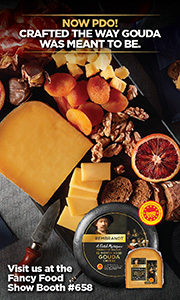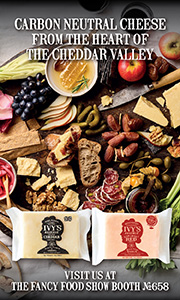
Dairy
Rockin’ and Rollin’ in the House that Humboldt Fog Built
By Lorrie Baumann
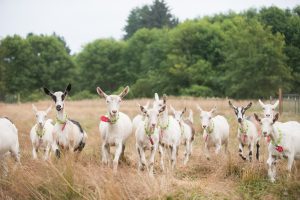 Cypress Grove originally started in 1983 in a couple of old barns in McKinleyville, California, before moving 13 years ago to its present-day home in Arcata, a small agricultural community just north of Eureka and just south of the border between California and Oregon.
Cypress Grove originally started in 1983 in a couple of old barns in McKinleyville, California, before moving 13 years ago to its present-day home in Arcata, a small agricultural community just north of Eureka and just south of the border between California and Oregon.
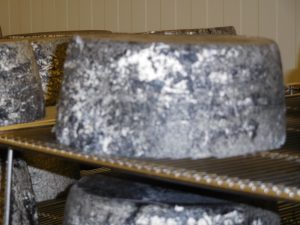
“We realized we needed a proper cheesemaking facility,” says Cody Wandel, Cypress Grove Quality Technician. “That gave us our first purpose-built cheese facility…. Our kind of cheese is very difficult to make and get to market in good condition. We’ve been evolving our ability to provide the optimum environment for the cheese.”
 In those days, Cypress Grove Chevre, as it was known then, consisted of about 15 or 20 people following the lead of Founder Mary Keehn in making high quality goat cheeses that adventurous eaters who weren’t familiar with goat milk cheeses found easy to love. An American food movement that valued the local, the sustainable, the artisanal, had just started gathering momentum, and Cypress Grove’s Humboldt Fog exploded into the scene as an American Original with aesthetics that combined a visually striking appearance with a mellow flavor that reminded precisely no one of the barnyard. “We were there and we were well established,” Wandel says “People in America decided they were willing to give goat cheese a try.”
In those days, Cypress Grove Chevre, as it was known then, consisted of about 15 or 20 people following the lead of Founder Mary Keehn in making high quality goat cheeses that adventurous eaters who weren’t familiar with goat milk cheeses found easy to love. An American food movement that valued the local, the sustainable, the artisanal, had just started gathering momentum, and Cypress Grove’s Humboldt Fog exploded into the scene as an American Original with aesthetics that combined a visually striking appearance with a mellow flavor that reminded precisely no one of the barnyard. “We were there and we were well established,” Wandel says “People in America decided they were willing to give goat cheese a try.”
Today, Cypress Grove is owned by Swiss holding company Emmi, a company with majority ownership by a cooperative of farmers and dairy operators that bought Cypress Grove from Keehn in 2010. Cypress Grove now employs over 70 people, including those at a new demonstration dairy made possible by Emmi’s capital investment, and Keehn is still the spiritual leader guiding the values that appeal to consumers concerned about the environment and social justice as well as flavor. “Emmi’s model is not to be involved in the day-to-day, so we really operate as an autonomous company,” Wandel says. “It’s been one of the challenges – how to grow and keep the sense of intimacy we all used to have with Mary back in the old days…. We pretty much are rolling the way we always did…. It’s very important that our goat cheese is the best you can get.”
“The goal of an artisan cheesemaker is to create a cheese that is roughly the same every time, as opposed to a commodity cheese, which is exactly the same every time,” he continues. “All of our cheeses are almost entirely hand-made, and they’re all made in the same process we’ve always made.”
Cypress Grove’s cheeses include the fresh chevres that were among the first products that Keehn made when she found herself with a herd of show goats and more milk than she and her family could use.
“I started raising goats as a show herd, but if you have enough animals to have a strong genetic base, it’s too much milk to drink,” she says. Her first thought was to sell the milk locally, but it was quickly apparent that there wasn’t enough of a local market for fluid goat milk, so Keehn began making cheese and selling it to retailers wherever she could find them, which was sometimes at the Winter Fancy Food Show, where she’d bring cheese in ice chests – or even in her purse – and urge show attendees to have a taste. “From the very beginning, I was selling out of the area,” she says. “I don’t know why we survived. The cheese was always good, but nobody liked it then…. If you have goats, you’re a little stubborn in the first place – and weird.”
Then came a chance for Keehn to go to France and learn more about traditional European cheeses, including the Morbier that was something of an inspiration for Humboldt Fog. Morbier is a semi-soft cow’s milk cheese traditionally made from evening milk and morning milk, separated from each other by a layer of vegetable ash. On her way home from that trip, Keehn had a dream in which she saw, almost photographically, an image of a goat cheese with a black layer of vegetable ash bisecting it like the coastal fog layer that frequently floats among the hills around her Humboldt County home. “The naivety of it – it’s wrong in many ways,” she reflects now. “I didn’t know what I didn’t know.”
“Nobody liked it for quite a while,” she adds. “We threw away a lot of cheese.”
Some of the people who did like it, though, were rather influential: New York Times food critic Florence Fabricant mentioned Humboldt Fog in a 1997 article about growing interest in fine cheeses, and Russ Parsons, a former food editor and columnist for the Los Angeles Times, asked Keehn to send some to Julia Child for her birthday. “She happened to taste it, and she liked it,” Keehn says.
Humboldt Fog is still made in essentially the same way that it was in those early days: by hand, by cheesemakers who are asked to remember that they’re not just making cheese – they’re making Humboldt Fog. There are a couple of differences: the cheese is now inoculated with some Geotrichum mold as well as the Penicillium culture in its original recipe, which extends its shelf life a little bit without affecting its flavor, and Cypress Grove is making – and selling – a great deal more of it now that Humboldt Fog has become one of America’s most popular artisanal cheeses. “It just takes time and really sticking with what you care about,” Keehn says.
The path from Cypress Grove’s earliest days is marked along the way by new cheeses, some of which are no longer made, although they’re remembered in plaques outside the meeting rooms in Cypress Groves’ new offices. Truffle Tremor, another aged goat cheese that’s fancied up with the addition of real truffle pieces for an earthy taste of knee-buckling decadence, is a hearty survivor of a ruthless market.
Truffle Tremor started as an experiment in whether truffles and goat cheese could find happiness together, and it wasn’t exactly love at first sight, Keehn remembers. She added some truffles to fresh chevre and realized immediately that the bright, clean flavors of her chevre and the mellow earthiness of the truffles conflicted, as did the contrasting textures of the truffles and the fresh cheese. “It was like a fight in your mouth,” she said. “It was so bad.”
Keehn responded by trying the same strategy that worked for the kids in “The Parent Trap” – putting the pair she loved away by themselves so they could fight it out, in the hope that maybe they’d find a way to get along. Two or three weeks later, she brought the aged truffled cheese out into a staff meeting and asked people what they thought. “We tried this cheese – I swear, this was my, ‘You coulda heard a pin drop’ moment,” recalls Cypress Grove Sales Director Bob McCall. “Nobody said a word for a long time, and then somebody just said, ‘I think you have a winner.’”
“I love it when they do the happy dance,” Keehn adds. “I don’t believe in doing something unless you can really knock it out of the park. There’s no need for another mediocre cheese…. For us, cheese is a vehicle to make people’s lives happier.”
KABRITA USA Expands Goat Milk Yogurt and Fruit Pouch Line
KABRITA USA, a line of premium goat milk formula and goat milk baby foods made with naturally easy-to-digest, non-GMO goat milk, is introducing a new flavor, Sweet Potato Apple Cinnamon. The new flavor is shipping to retailers nationwide this month.
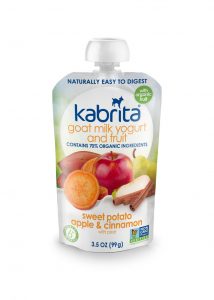 Sweet Potato Apple Cinnamon Goat Milk Yogurt is made with organic sweet potato, organic apple puree and organic cinnamon, as well as gentle, antibiotic-free whole goat milk yogurt for a comforting and nutritious snack or breakfast. High in vitamins A and E, it contains no artificial colors, flavors or preservatives, and comes in convenient, squeezable BPA-free packaging.
Sweet Potato Apple Cinnamon Goat Milk Yogurt is made with organic sweet potato, organic apple puree and organic cinnamon, as well as gentle, antibiotic-free whole goat milk yogurt for a comforting and nutritious snack or breakfast. High in vitamins A and E, it contains no artificial colors, flavors or preservatives, and comes in convenient, squeezable BPA-free packaging.
“KABRITA is excited to present this new, unique flavor that will add some warmth to the winter months,” said Simona Irwin, Director of Sales at KABRITA USA. “We know that little ones will be more likely to choose healthy snacks from a young age if companies like KABRITA provide delicious, nutrient-rich flavors that appeal to all palates. Our goat milk yogurt pouches are also a great alternative for the many parents out there whose kids are sensitive to cow’s milk.”
The full KABRITA product line includes Goat Milk Formula for Toddlers in small and large sizes, and Goat Milk Yogurt and Fruit pouches, which are also available in Mango Peach, Banana and Natural Vanilla Bean and Mixed Berry. The pouches can be introduced from six months of age and are approximately 70 percent organic. All products are naturally easy to digest and may be a solution for little ones with a cow’s milk sensitivity, which can surface as digestive discomfort, congestion or eczema. Goat milk is one of the most commonly consumed milks worldwide. KABRITA goat milk is produced without any exposure to antibiotics, growth hormones or preservatives and is free from artificial colors and flavors.
KABRITA is available at natural and traditional grocers nationwide, including Sprouts Farmers Market, Safeway, Whole Foods Market and major online retailers like Amazon.com, Walmart.com, Target.com, Costco.com and more. To learn more about KABRITA, the benefits of goat milk, and for expert nutrition insight via its Nourish Blog, visit http://www.kabritausa.com.
It’s Springtime for Bellwether Farms
By Lorrie Baumann
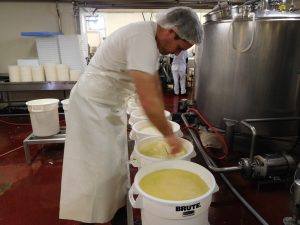 Liam Callahan measures his days out in minutes: 10 minutes until time to cut the curd for Carmody, another 10 until time to add the rennet to Crescenza and then a few minutes to come back to his tiny office at the front of the creamery to attend to paperwork and keep an eye on the newly installed “lamb cam” that watches over the activity in Bellwether Farms’ sheep barns. The metronomic ticking away of the tasks is a calm measure of certainty that stands in sharp counterpoint to the uncertainties in which Callahan, as well as every other farmer and artisanal cheesemaker, operates: the vagaries of weather that decide feed availability and costs and therefore the production costs of milk, the threats from new regulations decided in Washington and the weight of the paperwork they entail, the whims of consumers who might decide that dairy products are the villain behind the bulge at their waistlines.
Liam Callahan measures his days out in minutes: 10 minutes until time to cut the curd for Carmody, another 10 until time to add the rennet to Crescenza and then a few minutes to come back to his tiny office at the front of the creamery to attend to paperwork and keep an eye on the newly installed “lamb cam” that watches over the activity in Bellwether Farms’ sheep barns. The metronomic ticking away of the tasks is a calm measure of certainty that stands in sharp counterpoint to the uncertainties in which Callahan, as well as every other farmer and artisanal cheesemaker, operates: the vagaries of weather that decide feed availability and costs and therefore the production costs of milk, the threats from new regulations decided in Washington and the weight of the paperwork they entail, the whims of consumers who might decide that dairy products are the villain behind the bulge at their waistlines.
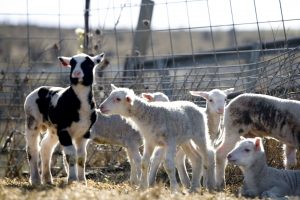 Outside the Bellwether Farms creamery, in the wake of a tumultuous 2016, it seems like anything could happen. Inside the creamery, the aging rooms full of Pepato and Blackstone are milk in the bank, the lamb cam monitor behind Callahan’s desk reassures that the farms’ future is fine, the clock says it’s time to drain the whey from the Carmody and prepare to turn it into basket-drained ricotta made in the traditional Italian way, and at 50, Callahan is optimistic about the future of the American artisanal cheese industry and his place in it. “I don’t think we’ve begun to exhaust the possibilities of people knowing where their food comes from,” he says. “People have realized that they enjoy knowing more about their food.”
Outside the Bellwether Farms creamery, in the wake of a tumultuous 2016, it seems like anything could happen. Inside the creamery, the aging rooms full of Pepato and Blackstone are milk in the bank, the lamb cam monitor behind Callahan’s desk reassures that the farms’ future is fine, the clock says it’s time to drain the whey from the Carmody and prepare to turn it into basket-drained ricotta made in the traditional Italian way, and at 50, Callahan is optimistic about the future of the American artisanal cheese industry and his place in it. “I don’t think we’ve begun to exhaust the possibilities of people knowing where their food comes from,” he says. “People have realized that they enjoy knowing more about their food.”
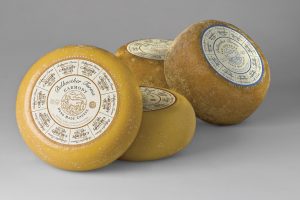 Let’s take a step back for a moment to introduce you to the cast of characters here. Carmody is a firm cheese made from pasteurized Jersey cow milk made by cheesemaker Liam Callahan at Bellwether Farms, which is near Petaluma, California. Crescenza is also made from pasteurized Jersey cow milk, but it’s a soft-ripened rindless cheese with a tart flavor. Pepato is an aged semi-soft sheep milk cheese studded with peppercorns. Blackstone is an aged mixed milk cheese studded with peppercorns and hand rubbed with vegetable ash. Liam Callahan is the cheesemaker at Bellwether Farms, which was founded by his mother, Cindy Callahan, who began raising sheep to keep the grasses under control on the farm she and her husband bought as a country home. “We were just basically looking for lawnmowers,” Callahan says.
Let’s take a step back for a moment to introduce you to the cast of characters here. Carmody is a firm cheese made from pasteurized Jersey cow milk made by cheesemaker Liam Callahan at Bellwether Farms, which is near Petaluma, California. Crescenza is also made from pasteurized Jersey cow milk, but it’s a soft-ripened rindless cheese with a tart flavor. Pepato is an aged semi-soft sheep milk cheese studded with peppercorns. Blackstone is an aged mixed milk cheese studded with peppercorns and hand rubbed with vegetable ash. Liam Callahan is the cheesemaker at Bellwether Farms, which was founded by his mother, Cindy Callahan, who began raising sheep to keep the grasses under control on the farm she and her husband bought as a country home. “We were just basically looking for lawnmowers,” Callahan says.
The family bought its first 20 bred ewes at a Petaluma livestock auction and the first lambs were born on December 24, 1986. “Our heads were spinning. We knew nothing from nothing,” Callahan says.
Suddenly, Cindy was the farm’s herd manager, a role that she is just beginning to step back from, in favor of what Callahan calls “a high hover” that will free her from the exigencies of the lambing schedule. The family kept those first lambs, bought more sheep and started selling extra lambs to local restaurants in 1987. “One of our very first customers was Chez Panisse,” Callahan recalls. “Our primary product was the lamb until 1990, when we built the dairy.”
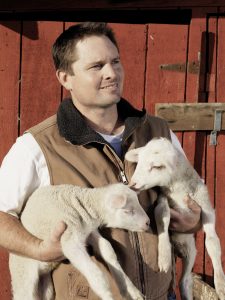 Callahan was just finishing college when a family friend visited from the Middle East. He noticed the sheep grazing on the slopes of Bellwether Farms’ hills and pointed out that where he came from, sheep were milked to make cheeses. That was when the Callahans realized that many of their favorite imported cheeses were, in fact, made from sheep milk. “That summer, we built the dairy, started milking the sheep and making cheese and going to farmers markets,” he said. That timing dovetailed with the growth of farmers markets and with the American food movement in general, and local chefs who had learned in Europe to go to farmers markets to find the freshest of local ingredients found Bellwether Farms cheeses at the farmers markets around San Francisco. “A lot of the value of these products is in explaining the story of how they’re made,” Callahan says. “Everything we’ve done has been because we were interested in it…. For the most part, the things we were interested in have aligned with the direction the market has gone.”
Callahan was just finishing college when a family friend visited from the Middle East. He noticed the sheep grazing on the slopes of Bellwether Farms’ hills and pointed out that where he came from, sheep were milked to make cheeses. That was when the Callahans realized that many of their favorite imported cheeses were, in fact, made from sheep milk. “That summer, we built the dairy, started milking the sheep and making cheese and going to farmers markets,” he said. That timing dovetailed with the growth of farmers markets and with the American food movement in general, and local chefs who had learned in Europe to go to farmers markets to find the freshest of local ingredients found Bellwether Farms cheeses at the farmers markets around San Francisco. “A lot of the value of these products is in explaining the story of how they’re made,” Callahan says. “Everything we’ve done has been because we were interested in it…. For the most part, the things we were interested in have aligned with the direction the market has gone.”
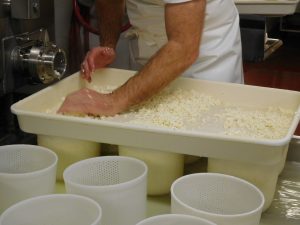 “I’m not doing anything, really, that hasn’t been done for centuries. But is it innovative to say, ‘I want to do it that way again?’” he adds. “The fact that this is done in a unique way resonates with a lot of consumers…. It’s more than cheese – there’s a history there. There’s a story there.”
“I’m not doing anything, really, that hasn’t been done for centuries. But is it innovative to say, ‘I want to do it that way again?’” he adds. “The fact that this is done in a unique way resonates with a lot of consumers…. It’s more than cheese – there’s a history there. There’s a story there.”
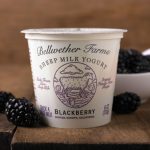 Today, Callahan makes highly regarded sheep milk yogurts and an array of award-winning cheeses from both his sheep milk and from cow milk purchased from local organic dairy farmers, and he’s planning the construction of a new creamery that should be finished in 2018 and that will expand his capacity with space for aging more cheeses and for giving him a little more elbow room around the cheese vats. He has recently been elected to the board of directors for the Dairy Sheep Association of North America, taking his place as a husbandman of sheep as well as the farm’s cheesemaker as his mother steps away from her herd management.
Today, Callahan makes highly regarded sheep milk yogurts and an array of award-winning cheeses from both his sheep milk and from cow milk purchased from local organic dairy farmers, and he’s planning the construction of a new creamery that should be finished in 2018 and that will expand his capacity with space for aging more cheeses and for giving him a little more elbow room around the cheese vats. He has recently been elected to the board of directors for the Dairy Sheep Association of North America, taking his place as a husbandman of sheep as well as the farm’s cheesemaker as his mother steps away from her herd management.
There’s been some controversy about the future of the sheep dairy industry in the U.S. after both Many Fold Farm and Barinaga Ranch ceased cheese production recently. Journalist Janet Fletcher discussed the reasons for that in a New York Times article in which she suggested that the American sheep dairy industry might be doomed by the economics of competing with European sheep milk cheeses. She noted that the cheeses produced by both Many Fold Farm and Barinaga Ranch were excellent cheeses, as evidenced by the many ribbons that their cheesemakers were taking home from competitions, but that wasn’t translating into profits for the farmsteads behind them.
Callahan believes, though, that despite these regrettable losses, there’s no immediate necessity for gloom about the future of the sheep dairy industry as a whole. “We really feel that we’re on the cusp of turning the corner, but I still feel there are a lot of reasons to be optimistic about what sheep milk has in the future,” he says. “The consumers respond to the milk and the products we make from it.”
He pointed out that recent nutrition research has shown that sheep milk has valuable health benefits, and the U.S. government has recently approved the importation of a limited supply of dairy sheep semen from France and that there are efforts under way to begin importing dairy sheep from Spain as well. “That’s a game-changer,” he says. Callahan plans to incorporate some of those genetics into his flock, which should result in lambs that will eventually grow into ewes that will produce more milk than do the ewes he has today. That should reduce his production costs for milk, and it will also make his lambs more valuable as potential breeding stock. All of that will give him a more solid economic base for his business. “We’re loving the sheep milk,” he says. “We’re just stuck on production…. Our ability to grow depends on our ability to use peak milk and put it in a cheese bank.”










